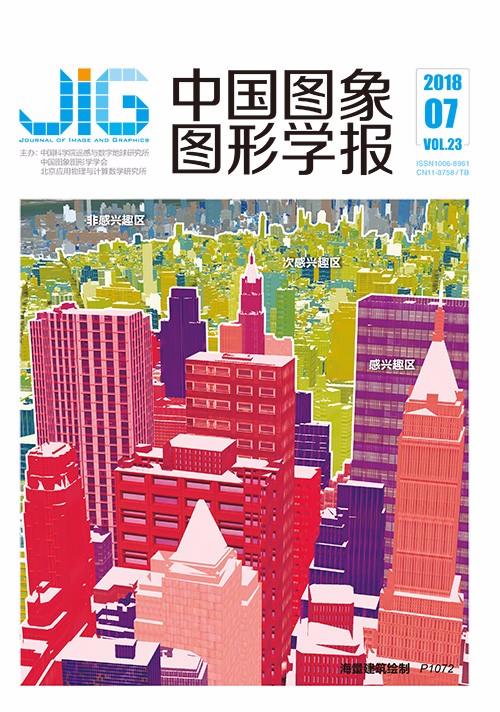
结构相似性的水下偏振图像复原
摘 要
目的 针对水下偏振图像存在雾状模糊和场景细节不明显的问题,以水体透射率图与目标反射光图像存在的相互独立性为基础,提出一种基于结构相似性的水下偏振图像复原方法,旨在提高水下偏振图像的清晰度、对比度和色彩真实度。方法 首先,获取同一水下场景下具有正交偏振方向且分别具有最大和最小光强的两幅偏振图像;然后根据透射率图与目标反射光之间的统计无关性,使用结构相似性推导求解透射率的关系式,并通过偏振差分图像计算透射率的初始值,利用该关系式进行水体透射率的迭代求解;最后将透射率代入偏振成像模型得到目标反射光图像,进而进行颜色校正得到复原图像。结果 选取多组正交的水下偏振图像作为研究对象,采用本文提出的方法与另两种偏振复原算法对其进行复原处理,使用对比度、信息熵、灰度平均梯度、峰值信噪比、增强量以及时间等量化指标进行评估。对比实验结果表明,本文算法在对比度、信息熵、灰度平均梯度、增强量以及颜色恢复上都优于另两种偏振图像复原方法,并有较大幅度的提高;灰度平均梯度和对比度较YY算法提高了一倍左右;本文复原图像的色彩分布较均匀使得图像的信息含量大,信息熵高;而突出的EME也证明本文算法的结果纹理清晰、对比度高以及图像复原程度好;提出算法的复原效果有显著的改善,但算法运行时间较长,实时性有待提高。结论 本文基于水下偏振成像模型的分析以及透射率图与目标反射光图像之间的统计无关性,从水体透射率的估计出发进行图像复原,有效地解决了水下偏振图像细节模糊、对比度低的问题。通过对算法实验效果的主客观分析表明,本文算法能有效地复原水下偏振图像,得到对比度高、细节明显和色彩丰富的恢复图像。
关键词
Underwater polarized images restoration algorithm based on structural similarity
Fan Xinnan, Chen Jianyue, Zhang Xuewu, Shi Pengfei, Zhang Zhuo(College of Internet of Things Engineering, Hohai University, Changzhou 213022, China) Abstract
Objective Numerous restoration algorithms for single images exist. They are remarkable in the defogging of sky images, but most of them cannot be applied directly to the restoration of underwater images. Image restoration aims to process degenerated images to recover the original image (before degeneration). Underwater illumination is insufficient and unevenly distributed, and these light variations affect the results obtained by restoration methods of single images. In general, the results are unsatisfactory. Polarization is the basic feature of light, and the reflected light of underwater objects are mostly partially polarized. Therefore, polarized underwater images have special polarization characteristics, and underwater image restoration based on multiple polarized images has gradually become popular in recent years. Focusing on the mistiness and unobvious details of underwater polarized images, a restoration method for underwater polarized images based on structural similarity is proposed. This method is expected to improve the clarity, contrast, and color fidelity of images.Method First, images taken through a polarizer at orthogonal orientations are obtained. The images have the best and worst backscatters. The water transmittance is only related to the depth of field and the attenuation coefficient of the water body; the object radiance depends on the incident light and the surface characteristics of the object. Therefore, we can assume that they are mutually independent. The structural similarity can measure the similarity of two images from brightness, contrast, and structure and can directly describe the correlation between the two images. Second, on the basis of the irrelevance relationship between the transmittance and the object radiance, the solution formula of water transmittance is derived by the structural similarity. The difference of the two polarized images is also the difference of the background lights in these images. This difference is also the function of depth of field. Thus, the polarized-difference image is used for calculating the initial value of transmittance during the iterative solution. An accurate transmittance is necessary for the good restoration of images. Finally, object radiance is obtained by inversing the underwater polarization imaging model, and color is corrected to produce the restored image. The color correction is based on a single point and chooses the point that has well-kept color information as the reference pixel. Then, the global pixels are normalized by the reference pixel to realize the color correction of the entire image.Result In the experiment, the proposed algorithm is compared with two other polarized restoration algorithms to test its effectiveness, and several groups of underwater polarized images are selected as research objects. The images used in this study were obtained from relevant studies. Quantitative indicators, such as contrast, information entropy, gray mean grads (GMG), peak signal-to-noise ratio (PSNR), measure of enhancement (EME), and runtime, are used for evaluating the effect. Results show that the contrast, information entropy, and GMG of our method are better than those of the two other algorithms. Moreover, a great restoration improvement effect is achieved. The YY algorithm removes the blur of the original images to a certain extent, but certain object areas of the recovered images are supersaturated. The images restored by the Huang algorithm are generally too dark to enable the identification of the scene details due to the inaccurate estimation of the degree of polarization of the object radiance. A comparison of the evaluation parameters shows that the contrast and GMG of our method are twice as high as those of the YY algorithm. Furthermore, the color distribution of the images recovered by our method are more homogeneous than those by YY, thus resulting in sufficient image information and the highest information entropy. The prominent EME also shows that our result has clear texture, high contrast, and good restoration. Certain color channels of the images obtained by the Huang algorithm are not recovered; thus, they have single color tones and the values of several color channels are as low as those of the raw images, thereby resulting in a small mean square error and an extremely high PSNR. In terms of time cost, our method and the Huang algorithm run relatively longer than YY because of the traversal process of the parameters.Conclusion On the basis of the analysis of the underwater polarization imaging model and the statistical independence relationship between the object radiance and water transmittance, image restoration is conducted successfully after the estimation of transmittance. The problems of blurred details and low contrast in polarized underwater images are effectively solved. The results of the subjective and objective analyses show that the proposed algorithm can recover polarized underwater images effectively and obtain restored images with high contrast, obvious details, and rich color. Compared to other algorithms, the proposed algorithm can improve the contrast, clarity, and color balance of polarized underwater images significantly, thus providing an important foundation of underwater target recognition and analysis.
Keywords
underwater polarization imaging image restoration structural similarity transmittance image processing
|



 中国图象图形学报 │ 京ICP备05080539号-4 │ 本系统由
中国图象图形学报 │ 京ICP备05080539号-4 │ 本系统由